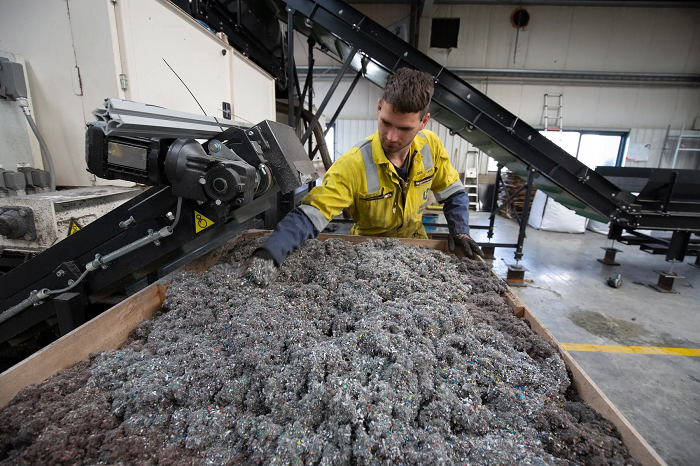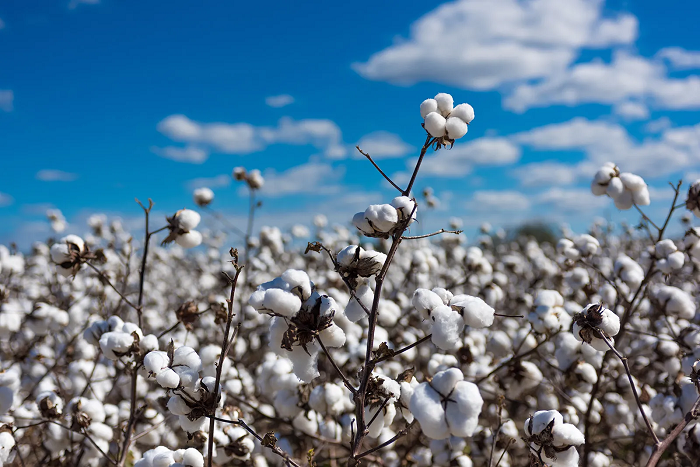FW
The US has banned imports of cotton or products made with cotton from Turkmenistan after discovering the reality of state-orchestrated forced labor.
While direct trade between the US and Turkmenistan is relatively small, the Central Asian country exports cotton to Turkey, Pakistan, India and China.
Apparel brands producing garments from those nations will need to pay attention to their cotton sources.
Similarly when forced labor was discovered in cotton harvesting in Uzbekistan, nearly 300 brands and retailers, including Adidas, H&M and Fruit of the Loom, signed a pledge to eliminate Uzbek cotton from their supply chain.
Knowing the origin of a garment isn't as simple as taking a look at the Made In label. While a T-shirt may be manufactured at a factory in Asia, the raw materials could come from all over the world.
More than 80 countries worldwide produce cotton, and spinners blend a lot of their cotton and mix it together from several different countries to maintain consistency and quality.
The challenge for apparel brands is knowing the source of cotton in their products — or they risk having their products turned away at the border. Most brands don’t buy yarn. And they don't have the relationships with yarn and textile mills.
In addition to working with suppliers, brands need to assess risk. Nearly three quarters of cotton exports from Turkmenistan go to Turkey. If an apparel brand has a production facility in Turkey, there's a higher risk Turkmenistan cotton is in their products.
Turkey’s exports increased 12.2 per cent in May compared to the same month last year.
On a quantity basis, the country’s exports increased by 3.8 per cent year-on-year in the month.
The country’s 12-month exports also jumped 10.2 per cent year-on-year. Exports during the first five months of 2018 were up 9.3 per cent over the same period last year.
In May, 19.8 per cent of Turkey’s exports came from the automotive sector, up 7.9 per cent compared to May 2017.
Auto sector exports were followed by the clothing and chemical products sectors.
Turkey’s exports to Germany, Britain and Italy rose 9.76 per cent, 12.51 per cent and 23.32 per cent, respectively, year-on-year in May.
Turkey continued to receive results from the export and growth campaigns launched in 2016. The country is expected to see a growth rate of 7.5 per cent in the first quarter.
The euro/US dollar parity is higher than last year. The Turkish lira has gone through a period in which it experienced a very fast value loss.
Capacity utilization rates, investment incentives and the industrial manufacturing index look healthy. The country is taking steps to abolish the current deficit problem with its investments and exports.
Variant has launched a new eco-friendly knitwear portal, which ethically sources luxury material and also utilises 3D localised production to significantly reduce waste. The portal allows its users to design unique, custom, high-quality products that are ready to ship in days.
To use this portal Variant users have to simply log into the platform, upload their custom design, drop it onto a 3D virtual garment that they select from the Variant stock, then place their order. The request is then sent to one of Variant’s localised factories, where the garment is produced and shipped to the customer within ten business days.
Compared to traditional manufacturing methods, the portal reduces textile waste by 95 per cent by knitting each style off the machine. With Variant's platform, anyone can be a designer and everyone can have access to the highest quality production teams and tools while reducing their environmental impact,
The ILO committee recently denounced the Haitian government for its failure to uphold international standards and national laws on working time and freedom of association. Although on paper, Haiti’s garment workers work for only 9 hours daily, in reality however they put in several more hours off the clock to reach their production targets.
The government has failed to uphold international standards and national employment laws, which is giving employers and their multinational customers free reign to steal from the world’s poorest workers. To make matters worse, the government has introduced a new law on working time which repeals existing standards on overtime, weekly rest and Sunday pay and nightime rates.
In May of last year, workers at 22 garment factories went on strike to demand higher wages. Dozens of union leaders and members of GOSTTRA have yet to be reinstated, in spite of very clear recommendations following an investigation by the ILO’s Better Work programme. Not only were they not reinstated, they were also blacklisted.
Backed by major brands like Stella McCartney and H&M, the Cradle-to-Cradle Institute’s Fashion Positive+ programme strives to ‘reinvent the basic building blocks of fashion’. The programme has awarded US$ 50 000 to Worn Again, an innovator developing chemical recycling technology to separate blends and create recycled polyester fiber.
An increasing number of Cradle-to-Cradle certified members have received a ‘gold’ label for their products and processes. In 2017, 12 new companies attained gold status. This is the second highest rating, with platinum being the best. The programme recently published the “Fashion Positive Emerging Material Innovators Report”, detailing the innovative efforts of 12 new pioneers in the textiles value chain.
To further encourage positive change, the programme recently published the “Fashion Positive Emerging Material Innovators Report”, detailing the innovative efforts of 12 new pioneers in the textiles value chain. The programme also hosts webinars and workshops to educate industry stakeholders about anything from chemically recycled fibres, using all-natural dyes, and how to minimise the amount of energy and water used by clothing producers.
According to Deloitte’s Global Powers of Luxury Goods 2018 report, the world's ten leading luxury corporations generated nearly half of the Top 100 ranking’s aggregate sales. The three groups at the top of the ranking, LVMH, Estée Lauder and Richemont, posted double-digit growth year-on-year for each of the last five years.
Sales growth slowed down for the majority of corporations, partly due to the comparison with high growth rates boosted by exchange rate differentials, but also as a result of the tough economic environment and the weakness of consumer demand for luxury products.
In the financial year 2016, the Top 100 luxury corporations are estimated to have generated a revenue of $217 billion in luxury goods, equivalent to only a 1% growth, compared to 5.8% the previous year at constant exchange rates. However, 57 of the 100 groups ranked did increase their revenue, and 22 of them posted double-digit growth.
Swedish furniture giant IKEA and American music mogul Sean Combs’ clothing have not yet signed the new accord for the safety of factory workers. The new pact is a three-year extension of the Bangladesh Accord, a legally-binding agreement between global brands and trade unions drawn up after the Rana Plaza collapse. It established a fire and safety program for the country’s $28 billion a year textile industry, which employs about 4 million people.
Till now, 175 of the 220 companies in the original accord have signed, but high-profile brands including Abercrombie & Fitch, Combs’ Sean John apparel and Britain’s Edinburgh Woollen Mill have not signed as yet. Campaigners have urged them to do so, arguing that other schemes such as IWAY lack transparency because they do not make inspection findings and reports public.
Bangladesh, which ranks behind only China as a supplier of clothes to Western countries, relies on the garment industry for more than 80 percent of its exports.
Ted Baker London has launched a new bedding collection that consists of reversible duvet and comforter sets, quilted and scalloped coverlets and shams as well as an assortment of decorative pillows. The collections are adorned with birds, butterflies and blooms. The detailed Entangled Enchantment Collection mimics print Ted Baker’s womenswear collections.
The full home product line is available online and in select Bed Bath & Beyond stores nationwide. Its prices start at $49.99 for decorative pillows and $129.99 for bedding. The range offers bright whites, colorful pastels and bold floral designs that reflect the brand’s most popular styles and signature prints, in line with Baker’s seasonal collections.
The Flight of the Orient bed linens feature sparkle-adorned blossoms among bejeweled birds with a palette of soft grays and pale pinks alongside zesty yellow and vibrant fuchsia. It is inspired by the richness of flora and fauna found in the royal gardens, intricately decorated branches, florals and hummingbirds combine in the opulent Highgrove print.
Bangladeshi garment exports to Japan grew by 1.94 percent to $445.99 million in July-January in 2017-2018 fiscal year and is expected to cross $1-billion mark at the end of the year. The country exported around 40 items to Japan including T-shirts, jersey pullovers, shirts, baby garments etc. Currently, the country exports mostly basic items but there is a huge opportunity to export fancy, fashionable and high value added items.
The Bangladeshi exporters have benefitted by special incentives of the government as nontraditional market. Japanese buyers are very strict in terms of quality and production process. They insist on 100% quality inspection of the goods where rest of the buyers is following AQL for quality auditing. On the other hand, they are also very cooperative. If manufacturer faces any problem and can explain logically, they not only understand it but also try to support the factory to overcome the issue. They consider the supplier and business as their partners and believe in mutual growth and development.
Alcis Sports has partnered with Flipkart to manufacture, sell and distribute apparel merchandise in India for FIFA World Cup 2018. The retailer has lined up a comprehensive range of over 550 articles exclusively available on Flipkart. This merchandise will include t-shirts, polo t-shirts, shorts, track pants, and tracksuits.
Besides online, the products will also be available across all the brand’s five exclusive stores and large format retail outlets such as Lifestyle, Shoppers Stop, Central, Globus, Sports Station, etc.
The licensed apparel range incorporates country-specific merchandise for some of the fan favourites such as Brazil, Germany, England, Spain, Portugal, France, Uruguay, Belgium and Sweden. The licensed apparel merchandise for the World Cup starts at Rs. 399 and consists of over 550 unique articles. The athleisure brand has the rights to sell in Sri Lanka, Pakistan and Nepal as well apart from India.











